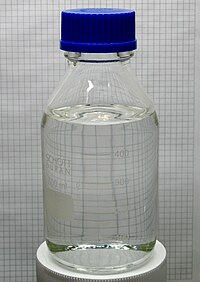
Photo from wikipedia
Ru(II) complexes of amide-phosphine-based tridentate ligands additionally containing pyridine, isoquinoline, and quinoline rings have been synthesized, and their catalytic utility for the selective hydration of nitriles to amides is explored… Click to show full abstract
Ru(II) complexes of amide-phosphine-based tridentate ligands additionally containing pyridine, isoquinoline, and quinoline rings have been synthesized, and their catalytic utility for the selective hydration of nitriles to amides is explored under the base-containing as well as base-free conditions. The chloride-ligated complexes 1-3 exhibited significant catalytic activity in the presence of a base, whereas hydride-ligated complexes 4-6 carried out the hydration of nitrile without the requirement of any base. The mechanistic studies revealed the involvement of [Ru-H] species as the active catalyst in the catalytic cycle. The [Ru-H] species assisted in the polarization of an incoming water molecule through [Ru-H···H-OH] dihydrogen bonding interaction and consequently aided in the attack of a positioned water molecule to a nitrile coordinated to a ruthenium center. Substrate binding studies and kinetic experiments further supported the mechanism. A wide variety of aromatic nitriles containing both electron-withdrawing and electron-releasing groups as well as other substrates including aliphatic nitriles, base-sensitive nitriles, and a few biologically relevant nitriles were employed for the selective hydration.
Journal Title: Inorganic chemistry
Year Published: 2022
Link to full text (if available)
Share on Social Media: Sign Up to like & get
recommendations!